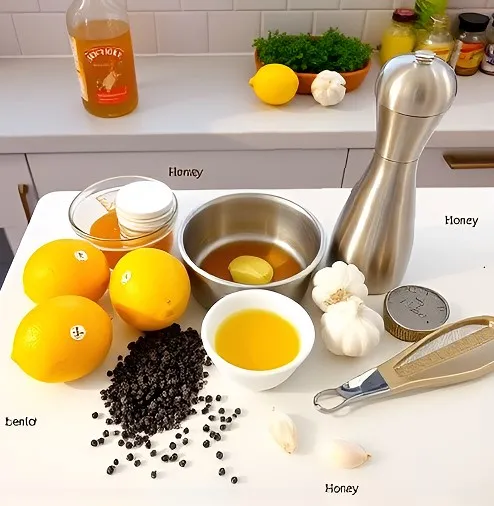Have you ever wondered how to elevate a simple dish into something truly extraordinary? Lemon pepper sauce might just be your culinary secret weapon. Whether you’re a kitchen novice or a seasoned chef, this guide will walk you through everything you need to know—from the basics to the boldest flavor combinations. We’ll explore what lemon pepper sauce is, how to craft your own, the various types available, and a myriad of ways to incorporate it into your meals. So, grab your apron and let’s dive right in!
Table of Contents
Defining Lemon Pepper Sauce: A Flavorful Introduction
Lemon pepper sauce is a vibrant condiment that harmoniously blends the zesty brightness of lemon with the sharp, warm bite of pepper. Unlike a simple seasoning, this sauce is designed to coat and cling to your food, infusing every bite with its distinctive flavor. It’s the go-to addition that transforms ordinary dishes into mouthwatering delights, offering a punchy boost that enhances your culinary creations.
The Key Ingredients: Lemon, Pepper, and More
At its core, lemon pepper sauce relies on fresh lemons and robust black pepper to deliver its signature taste. However, it’s the combination of additional ingredients like butter or olive oil, garlic, and a hint of sweetness from honey that rounds out the sauce. Butter or oil provides the necessary richness, while garlic adds depth, and honey balances the acidity of the lemon. These elements work in tandem to create a well-rounded and flavorful sauce.

A Brief History of the recipe
The lemon pepper flavor combination has a long-standing history, particularly as a popular seasoning for chicken dishes. Originally used as a dry rub, lemon pepper seasoning gradually inspired the creation of a wet, saucy variant. This evolution allowed cooks to apply the flavors more thoroughly, paving the way for the lemon pepper sauce we cherish today. Its versatility and delightful taste have made it a staple in kitchens around the world.
Lemon Pepper Sauce vs. Lemon Pepper Seasoning: What’s the Difference?
It’s essential to distinguish between lemon pepper seasoning and lemon pepper sauce. Lemon pepper seasoning is a dry mix typically sprinkled over food to add flavor, while lemon pepper sauce is a wet condiment designed to coat and enhance dishes. The seasoning provides a straightforward flavor boost, whereas the sauce delivers a more integrated and intense taste experience. Understanding this difference allows you to choose the right option based on your culinary needs.
Making Lemon Pepper Sauce From Scratch
The Perfect Recipe: A Step-by-Step Guide
Creating your own lemon pepper sauce is straightforward and rewarding. Begin by gathering fresh lemons, high-quality black peppercorns, butter or olive oil, garlic, and a pinch of salt. Start by zesting the lemons, ensuring you avoid the bitter white pith. Next, juice the lemons to extract fresh juice. If you’re using whole peppercorns, crush them to release their aromatic oils, or use pre-ground pepper for convenience.
In a small saucepan, melt the butter or heat the olive oil over medium heat. Add the minced garlic and sauté until fragrant, being careful not to burn it. Introduce the lemon zest and pepper, stirring briefly to combine the flavors. Pour in the fresh lemon juice and let the mixture simmer, allowing the flavors to meld together. Taste the sauce and adjust the salt as needed. Your homemade lemon pepper sauce is now ready to enhance a variety of dishes.
Choosing Your Lemons: Freshness and Flavor Impact
The quality of your lemons significantly influences the final taste of your lemon pepper sauce. Opt for fresh, heavy lemons that feel firm and juicy. A good lemon should yield slightly when pressed and emit a bright, citrusy aroma. Fresh lemons provide a vibrant flavor that bottled lemon juice simply can’t match, ensuring your sauce is as flavorful and aromatic as possible.
Selecting the Right Pepper: Types and Their Nuances
While black pepper is the classic choice for lemon pepper sauce, experimenting with different types can add unique nuances to your recipe. Freshly cracked black peppercorns offer a more vibrant and aromatic flavor compared to pre-ground pepper. Alternatively, white or pink peppercorns can introduce subtle variations, each contributing its own character to the sauce. Choosing the right pepper enhances the complexity and depth of your lemon pepper creation.
Enhancing the Sauce: Optional Ingredients and Variations
Lemon pepper sauce serves as a versatile base for various flavor enhancements. Adding red pepper flakes or a dash of hot sauce can introduce a spicy kick, while honey provides a touch of sweetness that balances the acidity of the lemon. For garlic enthusiasts, increasing the amount of minced garlic or incorporating garlic powder can intensify the savory profile. Fresh herbs like thyme or rosemary can add aromatic layers, elevating the sauce to new heights of flavor.
Tips for Homemade recipe
To achieve the perfect lemon pepper sauce, avoid overcooking the garlic, as it can turn bitter. Continually taste your sauce as it simmers to ensure the balance of lemon and pepper suits your preferences. Allowing the sauce to simmer briefly lets the flavors meld beautifully. Most importantly, infuse your sauce with a bit of love; homemade sauces have a unique depth and character that enhance any dish they accompany.
Equipment Needed to Create Your Best Sauce
You don’t need an extensive array of kitchen tools to make lemon pepper sauce. A small saucepan is essential for cooking, while a zester and lemon juicer are necessary for preparing the lemons. A pepper grinder is useful if you prefer using whole peppercorns, although pre-ground pepper works just as well. Additionally, a wooden spoon or spatula and a bowl for mixing complete the basic equipment needed to create your sauce.
Exploring recipe Variations
Spicy Lemon Pepper Sauce: Adding a Kick
If you crave a bit of heat, transforming your lemon pepper sauce into a spicy variant is simple. Incorporate red pepper flakes, a dash of hot sauce, or finely chopped jalapeños to infuse your sauce with fiery notes. This spicy lemon pepper sauce maintains the original’s bright and peppery profile while adding an exciting heat that complements grilled meats and vegetables alike.
Garlic Lemon Pepper Sauce: A Classic Combination
For garlic lovers, enhancing your lemon pepper sauce with extra garlic creates a robust and savory blend. Increasing the amount of minced garlic or adding garlic powder intensifies the sauce’s depth, marrying the tangy lemon and sharp pepper with rich garlic undertones. This classic combination is perfect for drizzling over roasted vegetables or using as a marinade for meats, delivering a harmonious balance of flavors.
Honey Lemon Pepper Sauce: A Sweet and Savory Twist
Introducing honey to your lemon pepper sauce creates a delightful sweet and savory balance. The natural sweetness of honey counteracts the tartness of lemon and the spiciness of pepper, resulting in a versatile sauce that pairs wonderfully with both savory and sweet dishes. This version is especially excellent on grilled chicken, roasted vegetables, or even as a glaze for baked goods, offering a unique and pleasing flavor profile.
Creamy Lemon Pepper Sauce: Indulgent and Rich
For those seeking a more decadent option, a creamy lemon pepper sauce is the answer. By stirring in ingredients like cream cheese, heavy cream, or Greek yogurt, you achieve a smooth and luscious texture. This rich sauce is ideal for dipping, drizzling over pasta, or enhancing creamy dishes like casseroles. The added creaminess complements the tangy and peppery flavors, creating a luxurious addition to your culinary repertoire.
Experimenting with Herbs: Lemon Pepper Herb Sauce
Incorporating fresh herbs into your lemon pepper sauce can elevate its flavor and aroma. Herbs such as thyme, rosemary, or dill add a fresh and aromatic dimension, making the sauce even more versatile. These additions not only enhance the taste but also introduce new layers of complexity, allowing your lemon pepper sauce to complement a wider range of dishes, from roasted meats to fresh salads.
Lemon Pepper Sauce: Culinary Applications
Sauce for Chicken: Wings, Tenders, and More
Lemon pepper sauce is the perfect companion for all chicken preparations. Whether you’re preparing crispy wings, juicy tenders, or a whole roasted chicken, this sauce adheres beautifully, infusing each bite with its zesty and peppery notes. Its ability to elevate the natural flavors of chicken makes it an indispensable addition to your grilling or baking routine, ensuring every dish is bursting with deliciousness.

Seafood and Lemon Pepper Sauce:
Beyond poultry, lemon pepper sauce shines when paired with seafood. The bright, citrusy flavor of the sauce complements flaky white fish, grilled shrimp, and pan-seared scallops exceptionally well. It balances the richness of seafood, providing a refreshing contrast that enhances the overall taste. Whether used as a marinade or a finishing drizzle, lemon pepper sauce adds a delightful twist to your seafood dishes.
Vegetables : Making Veggies Taste Amazing
Vegetables often benefit from a flavor boost, and lemon pepper sauce delivers just that. Roasted broccoli, grilled asparagus, and sautéed mushrooms all become more exciting when tossed in this vibrant sauce. The lemon and pepper introduce a layer of complexity that transforms ordinary vegetables into standout sides. This simple addition makes plant-based dishes more appealing and flavorful, encouraging even the most reluctant vegetable eaters to enjoy their greens.
Lemon Pepper Sauce as a Dip: More Than Just a Coating
Lemon pepper sauce isn’t limited to coating; it’s also an excellent dip for a variety of snacks. Fries, vegetable sticks, and chicken nuggets all pair wonderfully with this tangy and spicy condiment. Its versatility as a dip makes it a great addition to appetizers or party platters, providing a flavorful alternative to traditional sauces like ketchup or ranch.
Using the recipe as a Marinade
Marinating meats or tofu in lemon pepper sauce infuses them with deep, vibrant flavors. The acidity of the lemon helps tenderize proteins, while the pepper adds a robust taste. This method ensures that the flavors penetrate thoroughly, resulting in a more flavorful and juicy final dish. Whether you’re preparing chicken, beef, or vegetarian options, a lemon pepper marinade can take your meals to the next level.
Unique Uses: Exploring Beyond the Obvious
Don’t limit lemon pepper sauce to traditional applications. Think outside the box by using it on BBQ chicken flatbread, drizzling it over pasta dishes, or even incorporating it into salad dressings. Roasted potatoes and mixed salads can also benefit from a touch of lemon pepper sauce, adding a burst of flavor that enhances the overall dish. The versatility of this sauce allows for endless creative culinary experiments.
Serving Suggestions: Pairing with Sides
When serving lemon pepper-infused dishes, consider pairing them with complementary sides to balance the strong flavors. Fluffy rice, simple roasted vegetables, or a fresh salad work well alongside dishes coated in lemon pepper sauce. These sides provide a neutral backdrop that allows the sauce’s vibrant flavors to stand out, creating a harmonious and well-rounded meal.
Buying Lemon Pepper Sauce: What to Look For
Evaluating Bottled Lemon Pepper Sauce: A Buyer’s Guide
When shopping for lemon sauce, it’s essential to be a discerning consumer. Start by reading the labels carefully. Look for sauces that list real lemon juice or zest as primary ingredients, avoiding those that rely heavily on artificial flavors. Pay attention to the sodium content and the presence of preservatives, opting for brands that offer a cleaner, simpler ingredient list for a more natural taste.
Reading Labels: What Ingredients to Consider
Delving deeper into the nutritional information, seek out lemon pepper sauces that include ingredients like garlic, black pepper, and perhaps natural herbs or spices. Avoid products loaded with artificial additives, excessive salt, or high sugar content. A quality lemon pepper sauce should emphasize natural flavors, providing a delicious and authentic taste without unnecessary fillers.
Where to Buy Quality Lemon Pepper
High-quality lemon pepper sauce can typically be found in well-stocked grocery stores, particularly in the condiment aisle. Specialty food stores and farmers’ markets also offer unique, locally-produced options that may provide distinctive flavors. Additionally, online retailers present a convenient way to explore a broader range of brands and potentially discover new favorites without leaving your home.
Comparing Brands: Finding Your Favorite
Tasting different brands of lemon pepper sauce is a great way to find your preferred flavor profile. Some sauces may emphasize lemoniness, while others might highlight the pepper or incorporate additional flavors like garlic or honey. Conducting a taste test by purchasing small quantities from various brands allows you to identify the sauce that best suits your palate and culinary needs.
Storage Tips: Keeping Your Sauce Fresh
Proper storage is crucial to maintaining the freshness and flavor of your lemon pepper sauce. Once opened, always refrigerate the sauce to prolong its shelf life. Pay attention to the manufacturer’s recommendations regarding the ideal storage conditions and use-by dates. Ensuring the bottle is tightly sealed after each use helps prevent contamination and preserves the sauce’s quality for future use.
Health and Nutritional Aspects
Nutritional Breakdown: Calories, Fats, and More
The nutritional content of lemon pepper sauce can vary based on its ingredients. Sauces made with butter or oil will have higher fat content, while those with additional sweeteners may contribute more calories. Lemon provides a small amount of vitamin C, and the overall nutritional profile should be considered, especially if you’re monitoring your intake. Always check the nutritional information specific to the sauce you’re using or preparing.
Health Benefits of Ingredients
Lemon and black pepper offer several health benefits. Lemons are a good source of vitamin C, which is essential for immune function and skin health. Black pepper contains antioxidants that can help combat free radicals in the body. Additionally, garlic, often included in the sauce, is known for its anti-inflammatory and immune-boosting properties. These ingredients not only enhance flavor but also contribute positively to your health.
Moderation and Potential Concerns
While lemon pepper sauce is flavorful and can be part of a healthy diet, it’s important to use it in moderation. Some commercial sauces can be high in sodium or contain unhealthy fats, especially those made with excessive butter or oil. If you have specific dietary restrictions or health concerns, carefully read the labels to choose a sauce that aligns with your nutritional needs. Homemade versions allow you to control the ingredients, making it easier to maintain a balanced diet.
Troubleshooting Sauce Issues
My Sauce is Too Sour: Tips and Tricks
If your recipe sauce turns out too sour, there are simple ways to balance the acidity. Adding a pinch of sugar or a drizzle of honey can mellow the tartness. Incorporating a bit more butter or olive oil can also soften the sour notes, creating a more balanced flavor profile. Always add these adjustments gradually, tasting as you go to achieve the perfect balance.
My Sauce is Too Thick: How to Thin it Out
A sauce that’s too thick can be easily remedied by adding a small amount of liquid. Stir in water, additional lemon juice, or a splash of broth to reach your desired consistency. Add the liquid slowly, mixing thoroughly to ensure the sauce remains smooth and well-integrated. This adjustment allows you to tailor the thickness of the sauce to suit different culinary applications.
My Sauce is Too Thin: Thickening Techniques
If your sauce is too thin, you can thicken it by allowing it to simmer longer, which reduces the liquid and concentrates the flavors. Alternatively, creating a slurry by mixing a little cornstarch or flour with water and whisking it into the sauce can help achieve the desired thickness. Continue to simmer the sauce until it reaches the consistency you prefer, ensuring a smooth and velvety texture.
My Sauce isn’t Flavorful Enough: Adding Umami
A lack of depth in flavor can be enhanced by introducing umami-rich ingredients. Adding a small amount of soy sauce or Worcestershire sauce can boost the savory profile of your recipe. Incorporating extra garlic powder or even a touch of Parmesan cheese can also elevate the taste, providing that rich, satisfying umami flavor that makes the sauce truly exceptional.
Conclusion
Lemon pepper sauce is a versatile and flavorful addition to any kitchen, capable of transforming simple dishes into extraordinary meals. From its bright and zesty origins to the myriad of variations and applications, this sauce offers endless culinary possibilities. Whether you choose to make it from scratch, experiment with different ingredients, or select the perfect bottled version, lemon pepper sauce is sure to become a staple in your culinary repertoire. Embrace its vibrant flavors and discover the endless ways it can enhance your favorite dishes.

